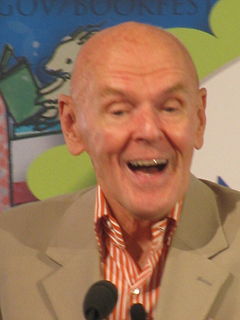A Quote by Richard Peck
September 11 We thought we'd outdistanced history Told our children it was nowhere near; Even when history struck Columbine, It didn't happen here. We took down the maps in the classroom, And when they were safely furled, We told the young what they wanted to hear, That they were immune from a menacing world. But history isn't a folded-up map, Or an unread textbook tome; Now we know history's a fireman's child Waiting at home alone.
Related Quotes
When I went to high school - that's about as far as I got - reading my U.S. history textbook, well, I got the history of the ruling class. I got the history of the generals and the industrialists and the presidents that didn't get caught. How 'bout you? I got all of the history of the people who owned the wealth of the country, but none of the history of the people that created it.
For me, seeing our history told in this light, the ones who did rebel, the ones who did revolt, the revolutionaries, excited me. Seeing this story of the Underground Railroad ... and that is such a proud part of our history that not a lot of us know about, where these brave men and women, they were heroes, really helped tear down the system of slavery just by running.
I don’t know much about history, and I wouldn’t give a nickel for all the history in the world. It means nothing to me. History is more or less bunk. It's tradition. We don't want tradition. We want to live in the present and the only history that is worth a tinker's damn is the history we make today.
History is a living horse laughing at a wooden horse. History is a wind blowing where it listeth. History is no sure thing to bet on. History is a box of tricks with a lost key. History is a labyrinth of doors with sliding panels, a book of ciphers with the code in a cave of the Saragossa sea. History says, if it pleases, Excuse me, I beg your pardon, it will never happen again if I can help it.
History is a story like any other, but black history is a story so devoid of logic that it frustrates the young reader. The young readers in my house, told of slavery and segregation, asked in disbelief, 'What? Why?' We - the parents of black children, the parents of all children - still need to tell that story.
If Mother Culture were to give an account of human history using these terms, it would go something like this: ' The Leavers were chapter one of human history -- a long and uneventful chapter. Their chapter of human history ended about ten thousand years ago with the birth of agriculture in the Near East. This event marked the beginning of chapter two, the chapter of the Takers. It's true there are still Leavers living in the world, but these are anachronisms, fossils -- people living in the past, people who just don't realize that their chapter of human history is over. '
I have to throw in on a personal note that I didn't like history when I was in high school. I didn't study history when I was in college, none at all, and only started to do graduate study when my children were going to graduate school. What first intrigued me was this desire to understand my family and put it in the context of American history. That makes history so appealing and so central to what I am trying to do.







































